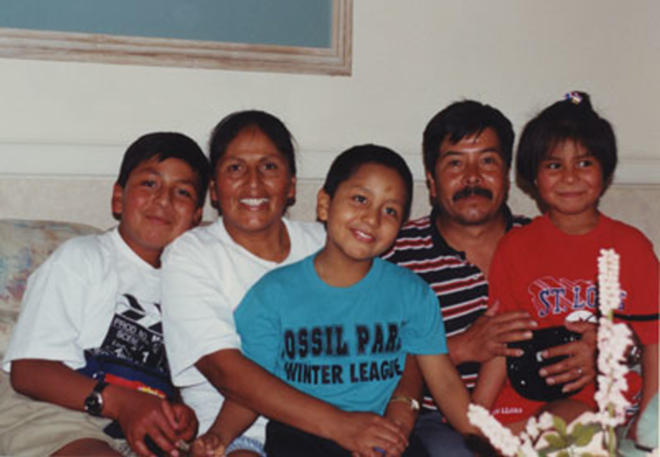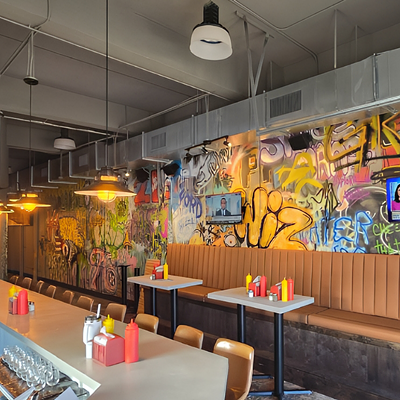Three days later, on May 21, 2002, Hector Mael Ojeda died wrapped in his mother's sweater.

January 6, 2005
Elvi received the letter in December 2004. She was to appear in January at the U.S. Citizenship and Immigration office in Tampa. They'd found her.
Elvi had come into the country five years earlier on a six-month tourist visa. When the visa expired, she received deferred action because of Mael's treatment. Nothing would be done on her immigration status until his care ended. But when Mael died, Elvi became illegal — and subject to deportation.
The fact that Elvi and the rest of her family had arrived in the U.S. at different times meant that her case would always be considered separately from theirs. When Felipe received a temporary green card in 2001, Nestor and Susana were automatically covered; Elvi was not. If he is granted a permanent green card before Elvi is deported, she will then be seen as the wife of a legal alien, and will be allowed to stay.
But Felipe applied for permanent status in August 2002. According to Jennifer Roeper, an immigration attorney handling Elvi's case pro bono for the Tampa firm of Fowler, White, Boggs & Banker, the U.S. government is still processing applications from 2001. "He filed this thing three years ago," Roeper says of Felipe. "You'd think three years would be enough. But it's just not. This is the post-9/11 era."
Elvira Penaloza could not be further from a terrorist, but that's how she felt walking into the immigration office, with Roeper and Donna Young, the McDonald House director, at her side. Her children went to school that day not knowing what would happen to their mom. Roeper didn't know either.
It was freezing in the office, a large room with a grey cement floor. Cameras were mounted on the ceiling, and holding cells were visible at the back. Elvi shook uncontrollably as she was photographed, fingerprinted. She thought she was going back to Bolivia.
The deportation officer could have locked her up. But he seemed to take to her. He told her to appear at the immigration court in Bradenton on March 24th. He wished her luck, and let her go.
On the day of Elvi's hearing, Roeper was now sure her client would be asked to leave the country, a "voluntary exit" that would not leave a mark on her record, but would still keep Elvi out of the U.S. for a decade. Elvi's concept of court came from TV — when she walked in, she expected the gavel to be slammed immediately.
But despite the protests of the Immigration and Customs Enforcement attorneys who wanted the case decided that day, the judge granted Roeper's request for a postponement. Elvi would have to come back Sept. 27, 2005. Maybe by then Felipe's green card would come through.
It didn't.
In September, Elvi again went before the judge. And again, Roeper was sure that her client would be deported. The two stood by Roeper's black Nissan Maxima, talking about the case, when a white feather drifted down from the sky. It passed by Roeper, almost touching her, then by Elvi, and landed on the ground. "It is a sign," Elvi thought. "A sign from Mael. He's talked to God, and something good will happen to us."
She looked at Roeper, confident that she would be OK. "Miracles can occur, even at the last minute," Elvi said. She was right, at least for now.
The judge acquiesced once more and set another date — Jan. 12, 2006.
"Many things can happen in 100 days," Elvi told Roeper afterwards. (As of press time, Felipe has not been approved for a green card, and Elvi is set to return to court for a third time on Jan. 12. It is unlikely that the judge will postpone her case again.)
If Elvi has to go back to Bolivia, the family has decided that she will go alone. Nestor, who's now in his freshman year of college after averaging a 3.5 in high school (he plans to be a pediatric hematologist), Susana, a sixth-grader at John Hopkins Middle School, and Felipe, still waiting for his green card, will stay in St. Pete.
"If I have to go back," Elvi says, sitting in the family's living room, "I will go back. But I won't take my kids back to poverty."
Their home is modest, but for the first time, Nestor and Susana have their own rooms. Elvi still makes empanadas, but she doesn't have a deep-fryer anymore, so she bakes them in the oven. (Nestor says the pies aren't as good as they were in Bolivia.) They have a few paintings on the wall, typical Floridian beach scenes. There's a large TV in the living room, next to it a bookcase that holds 12 volumes of Webster's Family Encyclopedia, Catechism of the Catholic Church, and a photography book, A Day in The Life of America. Snapshots cover every surface; most are of Mael.















